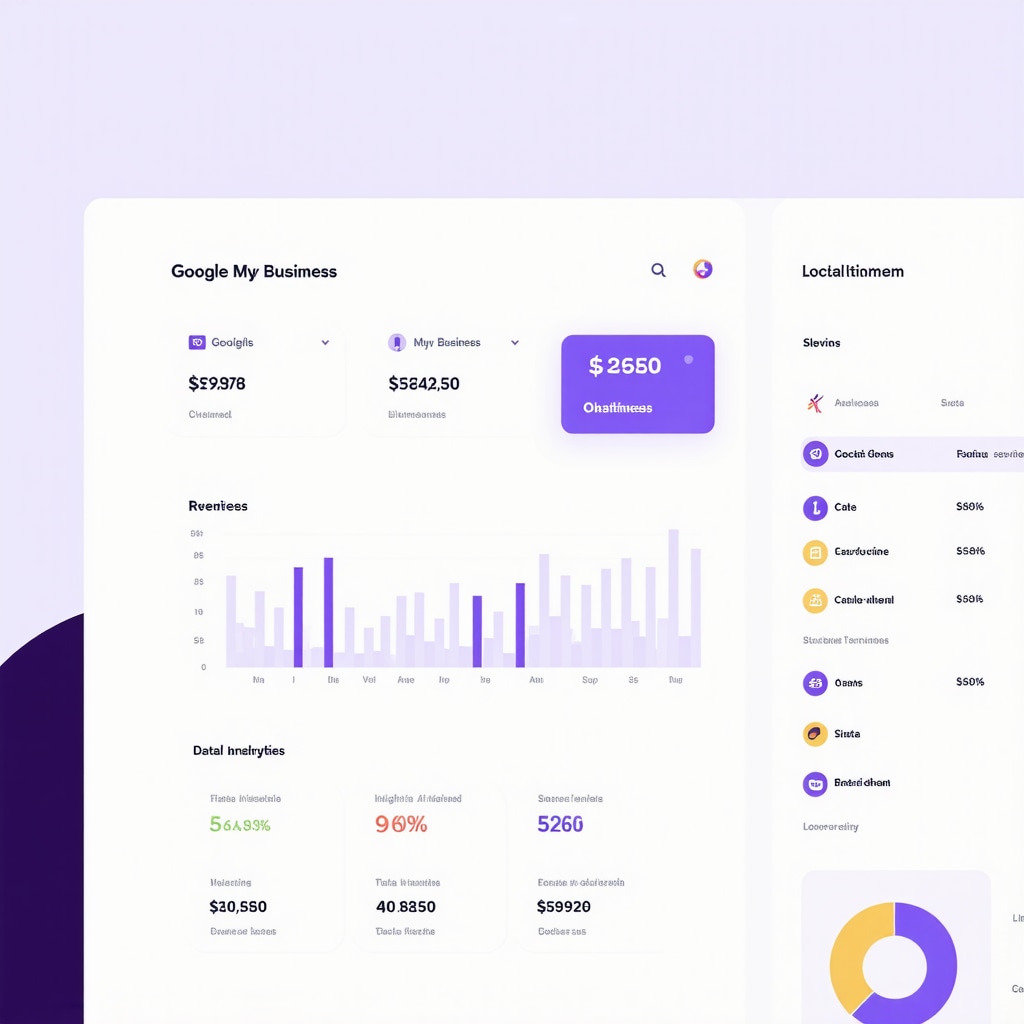Unlocking the Hidden SEO Power of GMB Reviews
Google My Business (GMB) reviews are more than just customer feedback—they are dynamic signals that can elevate your local search rankings and amplify your online visibility. For businesses striving to dominate local search in 2024, leveraging GMB reviews strategically offers a competitive edge that goes beyond traditional SEO tactics.
Understanding how to harness these reviews effectively requires a nuanced approach that intertwines reputation management, keyword optimization, and customer engagement. This guide delves into expert insights on transforming your GMB reviews into powerful ranking catalysts.
Transforming Customer Sentiments into SEO Gold
Each GMB review is a treasure trove of user-generated content rich with relevant keywords and phrases that reflect real customer experiences. Search engines value authentic, fresh content, and reviews serve as a natural source of this linguistic diversity.
By encouraging customers to mention specific products, services, or locations in their reviews, businesses can organically incorporate valuable long-tail keywords that improve relevance for local queries. For instance, a boutique hotel in Miami might see enhanced rankings by having guests include terms like “beachfront stay in Miami” or “family-friendly hotel near South Beach.”
Engaging Reviews: More Than Just Responses
Responding promptly and thoughtfully to reviews signals to Google that your business is active and customer-focused. This interaction not only builds trust with potential clients but also contributes to local SEO by increasing engagement metrics. Craft responses that naturally include key service descriptors and location terms to reinforce your business’s relevance.
How Do GMB Reviews Influence Local Search Algorithms?
Google’s local search algorithms consider review quantity, quality, and velocity as significant ranking factors. A steady influx of positive, diverse reviews indicates strong local relevance and customer satisfaction. Additionally, reviews with well-articulated content provide contextual clues that help Google understand your business offerings more precisely.
However, it’s important to maintain authenticity—fake or incentivized reviews can lead to penalties and damage your brand’s trustworthiness. Instead, focus on genuine engagement and ethical review generation practices.
Amplify Your SEO Strategy with Review-Driven Insights
Analyzing patterns in your GMB reviews can uncover valuable insights about customer preferences and emerging trends. Use this intelligence to refine your service offerings and update your GMB profile with targeted keywords gleaned directly from customer language. This method ensures your profile remains aligned with what your audience is searching for.
For businesses seeking to deepen their local SEO impact, integrating reviews into broader strategies like citation management and Google Maps optimization can compound ranking benefits. Explore comprehensive approaches in comprehensive local SEO optimization techniques to maximize results.
Fuel Your Growth: Invite, Engage, and Optimize
Encourage satisfied customers to leave detailed reviews by simplifying the process and offering exceptional experiences worth sharing. Tools and tactics from GMB review generation best practices can systematize this effort, helping you gather quality reviews consistently.
Remember, the synergy between accumulating authentic reviews and optimizing your Google Business Profile content is the cornerstone of powerful local SEO growth. To dive deeper into mastering this synergy, visit our complete guide on Google Business SEO.
For authoritative insights on how reviews impact SEO, Moz’s Local Search Ranking Factors offers an in-depth analysis backed by extensive data.
Have you experimented with review-driven SEO strategies? Share your experiences or questions below to help foster a community of local SEO excellence!
Harnessing Review Diversity for Enhanced Local SEO Authority
Not all reviews carry equal weight in the eyes of Google’s local search algorithms. Diversity in review sources and content enriches your profile’s authenticity and signals broad community engagement. For example, receiving reviews from varied demographics and different types of customer experiences—such as in-store visits, online purchases, or service calls—creates a layered content ecosystem that Google favors.
This diversity also helps mitigate risks associated with review spikes or sudden drops, which can sometimes trigger algorithmic suspicions. Incorporate strategies identified in effective GMB ranking strategies to ensure your reviews reflect a consistent and genuine customer base.
Integrating Semantic SEO with Customer Reviews
Semantic SEO involves understanding and leveraging the meaning behind search queries. GMB reviews provide a rich source of semantically relevant terms that can be used to optimize your business profile beyond simple keywords. By analyzing the natural language used in reviews, businesses can identify synonyms, related phrases, and local vernacular that align with how customers search.
Implementing semantic SEO tactics in your Google Business listing optimization can increase your chances of appearing in a wider array of local search variations. Tools like Google Keyword Planner can assist in correlating review language with high-impact search terms.
What are the best practices for responding to negative reviews to protect and boost SEO?
Negative reviews, when handled with professionalism and care, can become opportunities to demonstrate excellent customer service and transparency. Promptly acknowledging issues, offering solutions, and inviting offline communication show potential customers and Google that you value feedback and are committed to continuous improvement.
Responses should avoid generic or defensive tones; instead, tailor replies to address specific concerns using local keywords where appropriate. This not only helps in reputation management but also enriches your content with targeted semantic cues, indirectly benefiting SEO.
Leveraging Review Data Analytics for Strategic SEO Advancements
Advanced businesses tap into review analytics to uncover actionable insights. By categorizing reviews by sentiment, service type, or location, you can identify strengths to highlight and weaknesses to address. This granular approach helps tailor your Google Business Profile updates and local SEO campaigns with precision.
Moreover, tracking review velocity and comparing it against competitors provides benchmarks for your reputation growth. According to Moz’s Local Search Ranking Factors, consistent, high-quality reviews over time are pivotal for securing and maintaining top local rankings.
For businesses aiming to dominate their local market, combining these review-driven insights with comprehensive citation management and backlink strategies outlined in expert GMB citation services can create a formidable SEO foundation.
Engage with us below: How have you integrated review analysis into your local SEO strategy? Share your successes and challenges to inspire the community!
Decoding the Nuances of Review Velocity and Its Impact on Ranking Stability
Review velocity—the rate at which new reviews are acquired—plays a critical yet often misunderstood role in local SEO dynamics. A steady, organic flow of reviews signals ongoing customer engagement and business vitality to Google’s algorithms, whereas erratic spikes or prolonged droughts in review activity can raise red flags, potentially triggering ranking volatility.
To maintain a healthy review velocity, businesses should implement consistent outreach strategies, leveraging post-transactional follow-ups and incentivized reminders (while adhering strictly to Google’s guidelines against fake or biased reviews). Monitoring tools that track review acquisition patterns enable timely interventions to smooth out irregularities, ensuring your business profile projects reliability and authenticity over time.
Can integrating AI-driven sentiment analysis of GMB reviews refine local SEO strategies?
Absolutely. AI-powered sentiment analysis tools offer granular insights by categorizing reviews based on emotional tone, thematic content, and customer intent. This advanced analysis transcends basic star ratings, revealing nuanced customer perceptions and emerging pain points. By incorporating these insights, businesses can tailor their keyword strategies, service offerings, and response templates to align more closely with customer expectations and search intent.
For instance, if sentiment analysis highlights frequent mentions of “quick response times” or “friendly staff,” these phrases can be strategically embedded within your Google Business profile and responses, enhancing semantic relevance. Moreover, identifying negative sentiment trends early enables proactive service improvements and reputation management, which collectively bolster local SEO authority.
Exploiting Structured Data Markup to Amplify Review Signals
Beyond collecting and responding to reviews, integrating structured data markup (Schema.org) into your website and Google Business profile can significantly amplify the SEO value of your reviews. Schema markup helps search engines better interpret and display your review content in rich snippets, which can improve click-through rates and user engagement from the search results page.
Implementing the Review and AggregateRating schemas enables Google to showcase star ratings and review counts directly in local search listings. This visual trust indicator not only attracts more clicks but also reinforces your business’s credibility and relevance.
Detailed guidance on applying structured data to your Google Business profile can be found in resources like Google’s official documentation on review snippets.
Integrating Multi-Channel Review Strategies for a Holistic SEO Ecosystem
While GMB reviews are paramount, diversifying your review portfolio across multiple platforms—such as Yelp, Facebook, and industry-specific directories—creates a robust digital footprint that search engines interpret as widespread credibility. Cross-platform review synergy not only enhances your brand’s online reputation but also feeds into citation consistency, a vital local ranking factor.
Coordinating review acquisition efforts across these channels requires sophisticated CRM integrations and automated workflows that ensure timely review solicitations without overwhelming customers. This multi-channel approach also buffers your business against negative feedback impact on a single platform, distributing reputation risk more evenly.
Understanding how to harmonize these diverse review streams into a unified SEO strategy is an advanced skill set that separates local SEO leaders from followers.
Engage with us in the comments: Have you utilized AI or structured data to elevate your GMB review strategy? Share your insights and questions to advance our collective expertise.

Deciphering the Synergy Between Review Momentum and Local Ranking Resilience
In the intricate ecosystem of local SEO, the pace at which reviews accumulate—known as review velocity—serves as a crucial barometer of business health and customer engagement. Maintaining a consistent cadence of authentic reviews not only signals vitality to Google’s algorithms but also fortifies ranking stability against fluctuations caused by temporal anomalies or competitor activity.
Implementing a sophisticated, data-driven outreach cadence that integrates behavioral triggers and personalized messaging can ensure a natural and ongoing influx of customer feedback. Businesses should employ monitoring dashboards to detect and smooth out irregular peaks or valleys in review acquisition, thereby preserving the organic appearance and trustworthiness of their online reputation.
Harnessing AI-Powered Sentiment Analysis: A Game Changer for Local SEO Precision
Modern local SEO practitioners are increasingly adopting AI-driven sentiment analysis to parse the emotional undertones and topical nuances embedded within GMB reviews. By dissecting customer feedback into granular sentiment categories and thematic clusters, businesses can unearth actionable intelligence that transcends traditional star ratings.
This intelligence enables the crafting of hyper-targeted keyword strategies and refined service enhancements aligned with genuine customer expectations. For example, if sentiment trends highlight “prompt service” and “friendly staff” as recurring positive themes, these can be strategically woven into Google Business profile descriptions and responses to maximize semantic relevance and search visibility.
How Can AI-Driven Review Analytics Elevate Local SEO Strategies Beyond Conventional Metrics?
AI-powered review analytics facilitate multidimensional insight extraction, including emotional sentiment, behavioral intent, and satisfaction drivers. This granular perspective empowers businesses to anticipate customer needs, preemptively address pain points, and tailor their SEO content to mirror authentic user queries and vernacular.
Furthermore, integrating machine learning models with competitive benchmarking allows for dynamic adjustment of outreach and content strategies, ensuring sustained competitive advantage in volatile local markets. This advanced approach is increasingly recognized by SEO authorities such as Moz’s Local Search Ranking Factors as pivotal for next-level local search dominance.
Empowering Your SEO Arsenal with Structured Data and Schema Markup Innovations
The strategic deployment of Schema.org structured data markup transcends mere technical compliance, serving as a catalyst to amplify review signals and enrich search engine result pages (SERPs) with enhanced visual elements like star ratings and rich snippets. This not only elevates click-through rates but also conveys trust and authority at a glance.
Advanced implementations include leveraging Review, AggregateRating, and LocalBusiness schemas synergistically to create a comprehensive semantic framework that contextualizes your business offerings and reputation. Adhering to Google’s structured data guidelines ensures these rich results are displayed accurately, further bolstering local search prominence.
Orchestrating a Cohesive Multi-Platform Review Ecosystem for Unrivaled Local SEO Impact
To transcend the limitations of a single-platform focus, cutting-edge local SEO strategies integrate reviews from diverse channels such as Yelp, Facebook, TripAdvisor, and niche industry directories. This holistic review portfolio fosters a multi-dimensional digital footprint that signals broad-based credibility and relevance to search engines.
Implementing CRM-integrated automation workflows enables seamless solicitation and management of reviews across these platforms without overwhelming customers, ensuring consistent brand messaging and reputation harmony. This approach mitigates the risk of negative feedback concentration and enhances citation consistency—a critical factor in local ranking algorithms.
Engage with us below: How have you leveraged AI technologies or structured data to transform your GMB review strategies? Share your insights and challenges to elevate our collective expertise.

Frequently Asked Questions (FAQ)
How do Google My Business reviews directly influence local search rankings?
Google My Business reviews impact local SEO by signaling relevance, authority, and customer satisfaction to Google’s algorithms. The quantity, quality, diversity, and velocity of reviews contribute to higher local rankings by demonstrating active engagement and authentic user experiences. Well-articulated reviews containing relevant keywords help Google better understand your business offerings, enhancing search visibility for local queries.
What strategies ensure the authenticity of reviews without violating Google’s policies?
Authenticity is key: encourage genuine customer feedback through clear, ethical requests after service delivery without offering incentives for positive reviews. Avoid fake or incentivized reviews as they can result in penalties. Employ automated but compliant review solicitation tools and maintain transparency in responses to foster trust and comply with Google’s guidelines.
How can businesses leverage AI-powered sentiment analysis to improve their GMB review strategy?
AI-powered sentiment analysis enables businesses to dissect emotional tones and thematic patterns within reviews, uncovering customer satisfaction drivers and pain points. This data supports crafting targeted keyword strategies, tailoring service improvements, and customizing responses that resonate with customer expectations, thereby strengthening local SEO relevance and trustworthiness.
What are the best practices for responding to negative reviews to protect SEO and brand reputation?
Respond promptly and professionally, acknowledging specific concerns and offering solutions or offline follow-up. Avoid defensive or generic replies; instead, incorporate local keywords and service descriptors naturally. This approach demonstrates commitment to customer service, builds trust with prospective clients, and enhances semantic relevance for SEO benefits.
How does review velocity affect ranking stability, and how can businesses manage it?
Review velocity—the pace at which new reviews accumulate—signals ongoing customer engagement and business vitality. A steady, natural flow supports ranking stability, while erratic spikes or drops may trigger algorithmic suspicion. Businesses should implement consistent outreach strategies and monitor review acquisition patterns to maintain a balanced velocity that reflects authentic customer activity.
Why is integrating structured data markup important for maximizing the SEO impact of GMB reviews?
Structured data markup (Schema.org) helps search engines understand and display review information through rich snippets, such as star ratings and review counts, directly in search results. This enhances click-through rates, user trust, and perceived authority. Correct implementation amplifies the visibility and influence of your reviews within local search listings.
How does multi-channel review management contribute to a stronger local SEO profile?
Collecting and managing reviews across multiple platforms like Yelp, Facebook, and industry-specific directories creates a diversified and credible digital footprint. This cross-platform presence supports citation consistency and broadens signals of trust to search engines, mitigating risks related to negative feedback concentration on a single platform and enhancing overall local SEO authority.
Can semantic SEO be effectively applied using language from GMB reviews?
Absolutely. Semantic SEO involves leveraging the natural language, synonyms, and local vernacular found in customer reviews to align your business profile with diverse search intents and queries. Analyzing review content for relevant terms facilitates optimized business descriptions and responses, increasing visibility for a wider array of localized search variants.
What role does review diversity play in avoiding algorithmic penalties and boosting local rankings?
Diverse reviews from various customer demographics and interaction types establish a layered, authentic profile that search engines favor. This variety reduces suspicion from unnatural review patterns, helps maintain ranking resilience, and signals broad community engagement, which is a positive ranking factor in local SEO algorithms.
How can businesses use review analytics to inform broader local SEO strategies?
Review analytics provide insights into customer sentiment, preferences, and emerging trends. Categorizing and tracking reviews by service type, location, or sentiment helps businesses refine offerings, update GMB profiles with targeted keywords, and benchmark against competitors. Integrating these insights into citation building and backlink strategies creates a comprehensive, data-driven SEO approach.
Trusted External Sources
- Moz – Local Search Ranking Factors: A seminal research study providing data-driven insights into how various factors, including reviews, influence local search rankings. It offers comprehensive analysis on review quantity, quality, and velocity, making it invaluable for expert-level SEO strategy development.
- Google Developers – Structured Data for Review Snippets: Google’s official documentation on implementing Schema.org markup for reviews. It guides on technical best practices to enhance the display of review information in search results, critical for leveraging rich snippets and improving click-through rates.
- BrightLocal – Local Consumer Review Survey: An authoritative annual survey delivering in-depth data on consumer behavior regarding online reviews. It helps businesses understand review influence on purchasing decisions and informs strategic review solicitation and reputation management.
- Search Engine Journal – Advanced Local SEO Techniques: A respected industry publication offering expert articles and case studies on integrating review strategies with semantic SEO, AI analytics, and multi-channel reputation management to elevate local search performance.
- Google My Business Help Center: The official platform for guidelines and policies related to GMB reviews and profile management. Essential for ensuring compliance and staying updated on changes affecting local SEO tactics.
Conclusion
Harnessing Google My Business reviews is a pivotal strategy for businesses aiming to excel in local SEO in 2024. Reviews serve as authentic, dynamic content that enhances search relevance through keyword diversity, semantic richness, and user engagement signals. By maintaining a steady flow of genuine reviews, responding thoughtfully—including to negative feedback—and leveraging advanced tools like AI sentiment analysis and structured data markup, businesses can amplify their local search visibility and authority.
Moreover, integrating review insights into broader SEO frameworks, such as citation management and multi-channel reputation strategies, creates a resilient and comprehensive local SEO ecosystem. This expert approach not only drives higher rankings but also fosters trust and loyalty among prospective customers.
Take the next step: apply these sophisticated review-driven SEO tactics to your Google Business Profile, share your experiences, and explore our related expert content to stay ahead in the competitive local search landscape.




This post offers a comprehensive overview of how GMB reviews can be a game-changer for local SEO. I particularly appreciate the emphasis on authentic engagement and the strategic use of review-driven insights to shape services. In my experience with a local boutique, actively encouraging customers to mention specific keywords like ‘cozy neighborhood coffee shop’ or ‘family-friendly brunch spot near downtown’ has significantly improved our local search visibility. Responding promptly and thoughtfully to reviews also seems to foster a sense of community and trust, which resonates well with our audience.
One challenge I’ve faced is maintaining review velocity without seeming pushy. Has anyone found effective ways to gently prompt clients for reviews without risking low-quality or biased responses? Also, integrating AI sentiment analysis sounds promising for uncovering hidden trends—how are small businesses leveraging these tools cost-effectively? Would love to hear success stories or tips from others who have experimented with these approaches.